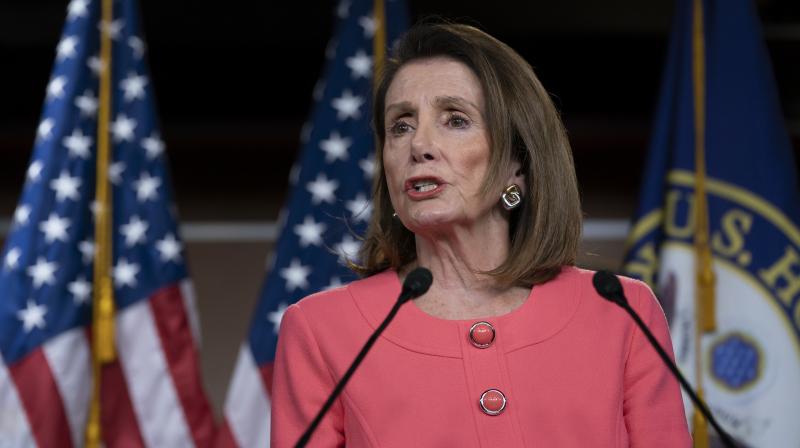Nancy Pelosi blames US Attorney General William Barr of lying to Congress

Washington: Democrats intensified their pressure on President Donald Trump's administration on Thursday as US House of Representatives Speaker Nancy Pelosi accused Attorney General William Barr of committing a crime by lying to lawmakers and a key committee chairman threatened to hold Barr in contempt of Congress.
Even as Democratic lawmakers accused the Trump administration of launching a growing attack on American democracy and the authority of Congress, the White House showed no sign of backing down. White House legal counsel Emmet Flood said in a defiant letter that Trump has the right to tell advisers not to testify to congressional panels on the findings of Special Counsel Robert Mueller's Russia inquiry.
The duelling statements marked a sharp escalation in the conflict between Trump's administration and Democrats who control the House of Representatives. With Trump seeking re-election next year, Democrats are weighing whether to try to remove the Republican president from office using the impeachment process while pressing forward with demands for information on his taxes, his businesses and other topics.
Shortly after Barr refused to appear before House Judiciary Committee, Pelosi accused him of lying to lawmakers about interactions with Mueller after the special counsel ended a 22-month investigation into Russia's efforts to interfere in the 2016 US election to boost Trump's candidacy.
"That's a crime," Pelosi, the top Democrat in Congress, told reporters, referring to Barr's congressional testimony.
Justice Department spokeswoman Kerri Kupec called Pelosi's allegation "reckless, irresponsible and false."
Democrats have accused Barr of misleading Congress by testifying in April he was unaware of any concern by the special counsel's team about Barr's initial March 24 characterization of the report, an account that led Trump to claim full exoneration. Barr failed to mention a March 27 letter he got from Mueller complaining that Barr's March 24 account did not "fully capture the context, nature and substance of this Office's work."
Judiciary Committee Chairman Jerrold Nadler threatened to hold Barr in contempt of Congress if he does not provide a full, unredacted copy of Mueller's report and the underlying evidence, as the panel has requested by a subpoena that had a Wednesday deadline. That could potentially lead to fines or imprisonment for the top US law enforcement official.
Barr released Mueller's report on April 18, with some parts blacked out to protect sensitive information.
Several Democrats have called on Barr, who Trump appointed after firing Jeff Sessions as attorney general, to resign.
Pelosi and other House Democrats previously had cautioned against launching the impeachment process, which would begin in the House but would face long odds of success in the Republican-controlled Senate and could alienate voters ahead of the 2020 presidential election.
But Pelosi said the Trump administration was continuing to ignore congressional subpoenas and noted that Congress launched impeachment proceedings against President Richard Nixon after he resisted similar demands. Nixon resigned in 1974.
Pelosi said Trump's "blanket statement that he's not going to honour any subpoenas is obstruction of justice."
The White House signalled little appetite to cooperate. Flood, in a letter obtained by Reuters, said Trump's decision to let advisers cooperate when Mueller was conducting his investigation does not extend to congressional oversight investigations now that the inquiry has been completed.
Flood also said Mueller's 448-page report suffered from "an extraordinary legal defect" by failing to determine whether Trump had committed the crime of obstruction of justice.
Mueller "instead produced a prosecutorial curiosity - part 'truth commission' report and part law school exam paper," Flood wrote to Barr in a letter dated a day after the report was released.
Democrats have argued Trump waived the right to assert executive privilege - which allows a president to withhold information about internal executive branch deliberations from other branches of government - by allowing advisers to cooperate extensively with Mueller.
Barr cancelled his House testimony after clashing with Nadler over the hearing's format, particularly having staff lawyers question him in addition to committee members. Nadler said he will move forward with a contempt citation as soon as Monday.
"The very system of government of the United States - the system of limited power, the system of not having a president as a dictator - is very much at stake," Nadler told reporters after a 15-minute committee session held in place of Barr's appearance.
Democrats have said they may issue a subpoena to try to force Barr to testify.
Barr spent four hours before a Republican-led Senate committee on Wednesday defending his handling of Mueller's report and justifying Trump's actions.
The report detailed extensive contacts between Trump's 2016 presidential campaign and Moscow and the campaign's expectation that it would benefit from Russia's actions, which included hacking and propaganda to boost Trump and harm Democratic candidate Hillary Clinton. The report also detailed a series of actions Trump took to try to impede the investigation.
Mueller, a former FBI director, concluded there was insufficient evidence to show a criminal conspiracy and opted not to make a conclusion on whether Trump committed obstruction of justice, but pointedly did not exonerate him. Barr has said he and Rod Rosenstein, the Justice Department's No. 2 official, then determined there was not enough evidence to charge Trump with obstruction.

